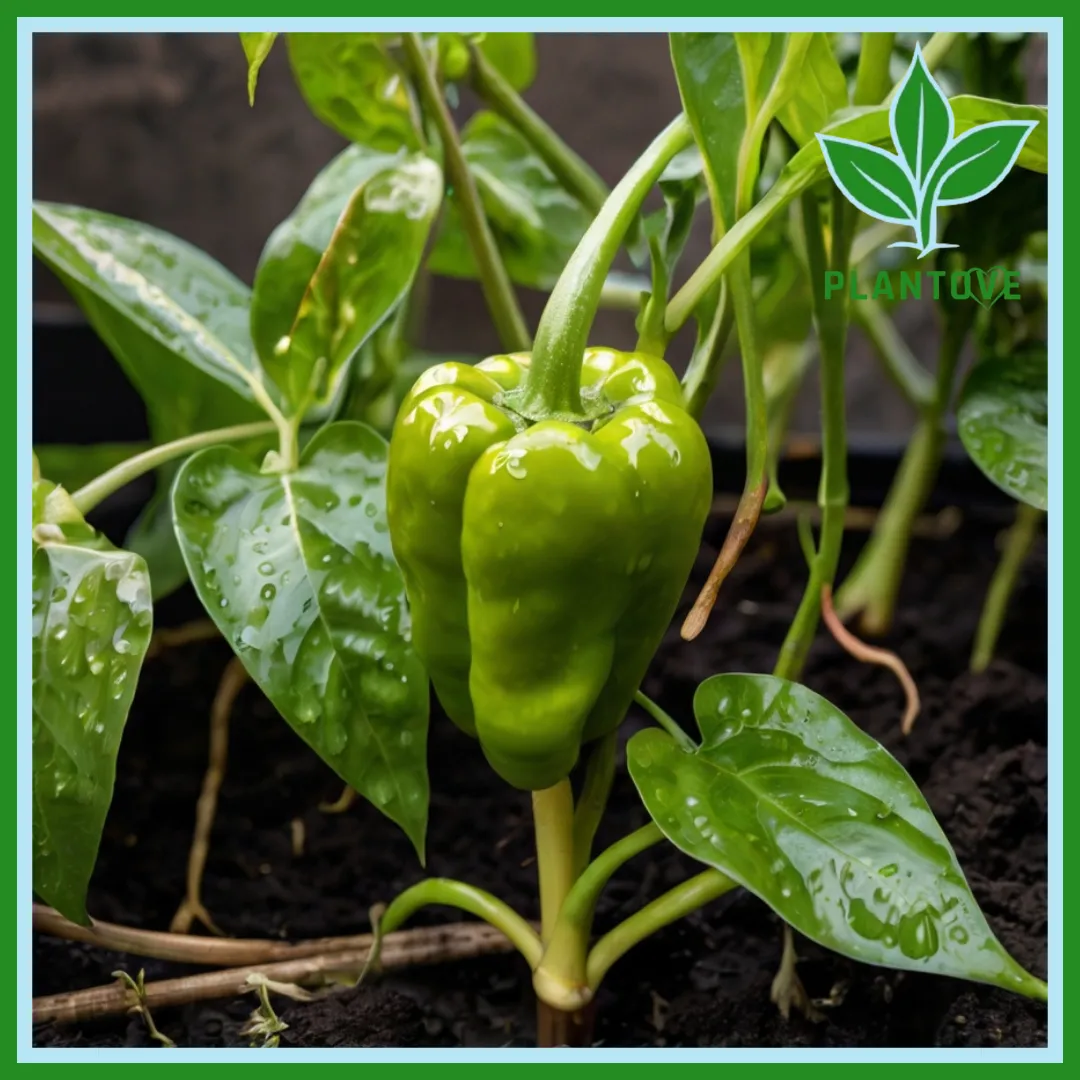Pepper plants are a favorite for home gardeners due to their vibrant fruits and relatively simple care requirements. However, one question that frequently arises is, “Can pepper plants be overwatered?” The short answer is yes. Overwatering pepper plants can cause various problems that stunt their growth and affect their fruit production. In this article, we will discuss the signs of overwatering, how to prevent it, and how to properly water your pepper plants for optimal growth.
Understanding the Water Needs of Pepper Plants
Before diving into overwatering issues, it’s crucial to understand the water needs of pepper plants. While peppers love warmth and sunlight, they also require consistent moisture to thrive. The key is to strike a balance between keeping the soil moist but not waterlogged.
Pepper plants generally prefer well-draining soil and moderate watering. Typically, watering 1-2 inches per week is sufficient, but this can vary based on weather conditions, soil type, and the growth stage of the plant. More importantly, ensuring good drainage is vital to prevent water from sitting in the soil, which can lead to overwatering.
Can Pepper Plants Be Overwatered?
Yes, pepper plants can be overwatered, and when they are, the consequences can be detrimental. Overwatering can lead to poor oxygen circulation around the plant roots, causing stress and increasing vulnerability to diseases.
How Overwatering Affects Pepper Plants
When you overwater pepper plants, the excess moisture can have several adverse effects:
- Root Rot: Too much water in the soil can cause the roots to suffocate and start to rot. This weakens the plant and eventually leads to its demise if not addressed quickly.
- Fungal Diseases: Excess water promotes the growth of harmful fungi, which can infect the roots and stem. Diseases such as damping-off and fusarium wilt thrive in waterlogged conditions.
- Nutrient Deficiency: Overwatering flushes away essential nutrients in the soil, leading to deficiencies. Even if you’re using a nutrient-rich fertilizer, overwatering can wash away those nutrients before the plant can absorb them.
- Yellowing Leaves: One of the earliest signs of overwatering is the yellowing of leaves. When pepper plants are overwatered, their leaves turn yellow and may eventually fall off due to the stress of insufficient oxygen uptake.
- Stunted Growth: Overwatering causes the roots to stay in waterlogged soil, preventing them from growing deep into the soil. This stunts the plant’s overall growth, as the roots cannot absorb sufficient nutrients.
Signs of Overwatering in Pepper Plants
To prevent the damage that overwatering can cause, it’s important to recognize the signs early. Here are the most common signs that your pepper plant is receiving too much water:
- Yellowing Leaves: As mentioned, yellowing leaves are a clear indication that the plant is being overwatered.
- Wilting Despite Wet Soil: If your pepper plant wilts while the soil remains wet, it’s a sign that the roots are struggling and could be drowning.
- Mushy or Soft Stems: Overwatering can lead to stem rot, which makes the stems soft and mushy. This is often a sign of root rot.
- Mold on Soil Surface: Excess moisture can cause mold to grow on the surface of the soil. Mold is a clear indication that the soil is not draining properly.
- Slow or Stunted Growth: When pepper plants receive too much water, their growth will slow down as the roots are unable to function properly.
How to Prevent Overwatering
Prevention is better than cure when it comes to overwatering. Here are some strategies to ensure you don’t overwater your pepper plants:
1. Check the Soil Before Watering
The easiest way to prevent overwatering is to check the soil’s moisture level before watering. Stick your finger about an inch deep into the soil—if it feels dry at that depth, it’s time to water. If it’s still moist, wait a day or two before checking again.
2. Use Well-Draining Soil
Pepper plants thrive in well-draining soil. Consider adding organic matter like compost or perlite to improve soil drainage. This helps prevent water from sitting in the soil, reducing the chances of overwatering.
3. Ensure Proper Drainage in Containers
If you’re growing pepper plants in containers, ensure that the pots have adequate drainage holes. This allows excess water to escape, preventing it from pooling at the bottom. Additionally, using pots with proper drainage can significantly reduce the risk of overwatering.
4. Water at the Right Time
Water your pepper plants in the morning to give the water time to evaporate during the day. This helps to prevent the soil from staying wet for too long. Watering in the evening can leave the soil too moist overnight, promoting fungal growth.
Can Pepper Plants Recover From Overwatering?
If your pepper plants show signs of overwatering, don’t panic. In many cases, plants can recover if you act quickly. Here’s how you can help your overwatered pepper plants recover:
1. Stop Watering
The first step is to stop watering the plant immediately. Allow the soil to dry out before resuming a more moderate watering routine.
2. Improve Drainage
Check if the soil is compacted and preventing proper drainage. If the soil feels too heavy, consider repotting your pepper plant in fresh, well-draining soil to give the roots a better environment to recover.
3. Prune Damaged Roots
If the plant is suffering from root rot, prune any blackened or mushy roots you find. This will help prevent the spread of the disease and give the healthy roots a chance to recover.
4. Use Fungicides
If your pepper plant has developed fungal diseases due to overwatering, consider using a fungicide to prevent further damage. Ensure that the fungicide you use is safe for edible plants, especially if you plan to harvest the peppers.
Proper Watering Techniques for Pepper Plants
Proper watering is crucial for the healthy growth of pepper plants. Here are a few tips to ensure your pepper plants receive the right amount of water:
1. Water Deeply but Infrequently
Instead of watering your pepper plants lightly every day, aim for deeper, less frequent watering sessions. This encourages the roots to grow deeper into the soil and improves the plant’s drought tolerance.
2. Mulch to Retain Moisture
Applying a layer of mulch around the base of your pepper plants can help retain moisture in the soil, especially during hot weather. Mulch also helps to reduce the evaporation rate and regulate soil temperature.
3. Adjust Watering Based on Weather
Pepper plants will need more water during hot, dry periods and less water during cooler or rainy weather. Always adjust your watering schedule based on the weather conditions to avoid overwatering or underwatering.
FAQs About Overwatering Pepper Plants
1. How often should I water pepper plants?
Pepper plants should be watered about once or twice a week, depending on the weather and soil conditions. Always check the soil moisture before watering.
2. Can overwatering kill my pepper plant?
Yes, overwatering can lead to root rot and other problems that can ultimately kill the plant if not corrected in time.
3. How do I know if my pepper plant is overwatered?
Yellowing leaves, wilting despite wet soil, slow growth, and mushy stems are all signs of overwatering.
Conclusion
In answer to the question, “Can pepper plants be overwatered?”—yes, they certainly can. Overwatering can lead to a host of problems, from root rot to nutrient deficiency. However, by understanding the water needs of pepper plants, checking the soil before watering, and using well-draining soil, you can easily avoid this common gardening mistake. By following these tips, you’ll ensure your pepper plants remain healthy, vibrant, and productive.

